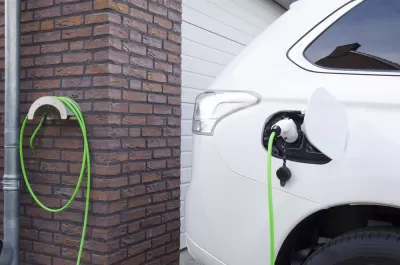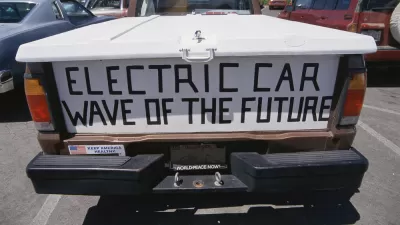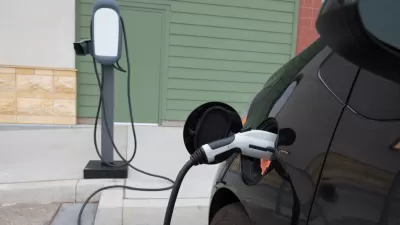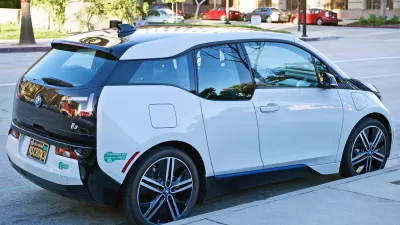Battery electric vehicles (without gas tanks) are eligible for a $2,500 California rebate, on top of the federal $7,500 tax credit. A bill before the state Senate would quadruple it.

[Updated August 29, 2017] California may be the nation's leader in terms of climate mitigation laws and regulations, but it does not look like the state will meet it's new 2030 target that calls for reducing emissions 40 percent by 2030. Two recent studies, one by the California Air Resources Board, the other by the non-profit Next 10, point the finger at the state's auto culture, as emissions are dropping in all other sectors but the largest, transportation.
Notwithstanding a generous financial incentive program and other perks, not enough electric vehicles (EVs) are being purchased by the state's residents, reports Russ Mitchell for the Los Angeles Times.
In 2016, of the just over 2 million cars sold in the state, only 75,000 were pure-electric and plug-in hybrid cars [3.75 percent]. To date, out of 26 million cars and light trucks registered in California, just 315,000 are electric or plug-in hybrids [0.06 percent].
Is the problem that EVs cost too much?
The idea behind Assembly Bill 1184: "Vehicular air pollution, electric vehicles – incentives," by Assemblyman Phil Ting (D-San Francisco), is "to use state rebate money so the consumer needn’t pay more for an electric compact car than a similar gasoline-powered compact car."
That’s the essence of the plan that could lift state rebates from $2,500 to $10,000 or more for a compact electric car, making, for example, a Chevrolet Bolt EV electric car [starting at $37,495] cost the same as a gasoline-driven Honda Civic [starting at $18,740].
That's pretty close. The all-electric Bolt is also eligible (for the time-being) a $7,500 federal Plug-In Electric Drive Vehicle Credit, bringing the cost down to $19,995.
The budget for such a program would be $3 billion, up from the $449 million the state has spent over seven years that the rebate program has existed, and that has created concerns for legislators and state legislative analysts, adds Mitchell.
The bill is opposed by Republicans averse to taxpayer subsidies and even the Legislature’s own analysts have called it “duplicative,” “unclear” and “problematic.
The legislative analysis goes into depth on the source of the funds, the Greenhouse Gas Reduction Fund, consisting of proceeds from the cap-and-trade auction of carbon permits. Last month, legislation to continue cap-and-trade beyond 2020 passed the legislature and was signed by Gov. Jerry Brown.
Or is the problem a lack of charging infrastructure?
A University of California study, also released last month, concluded the major obstacle to widespread adoption of EVs was a lack of charging infrastructure, the topic of a July 6 post: "Charging Anxiety, Not Price Anxiety, the Biggest Impediment to Electric Vehicle Adoption."
AB 1184 is co-sponsored by Advanced Energy Economy, a national association of business leaders working on clean energy, and NextGen America, founded by business leader, philanthropist and political and environmental activist, Tom Steyer.
The bill has passed the Assembly and is before the Senate Appropriations Committee. It needs to pass the legislature by Sept. 15 and be approved by Gov. Jerry Brown to become law.
Hat tip to Julie Bloom, editor of California Today (New York Times).
FULL STORY: Should California spend $3 billion to help people buy electric cars?

Planetizen Federal Action Tracker
A weekly monitor of how Trump’s orders and actions are impacting planners and planning in America.

Congressman Proposes Bill to Rename DC Metro “Trump Train”
The Make Autorail Great Again Act would withhold federal funding to the system until the Washington Metropolitan Area Transit Authority (WMATA), rebrands as the Washington Metropolitan Authority for Greater Access (WMAGA).

The Simple Legislative Tool Transforming Vacant Downtowns
In California, Michigan and Georgia, an easy win is bringing dollars — and delight — back to city centers.

The States Losing Rural Delivery Rooms at an Alarming Pace
In some states, as few as 9% of rural hospitals still deliver babies. As a result, rising pre-term births, no adequate pre-term care and "harrowing" close calls are a growing reality.

The Small South Asian Republic Going all in on EVs
Thanks to one simple policy change less than five years ago, 65% of new cars in this Himalayan country are now electric.

DC Backpedals on Bike Lane Protection, Swaps Barriers for Paint
Citing aesthetic concerns, the city is removing the concrete barriers and flexposts that once separated Arizona Avenue cyclists from motor vehicles.
Urban Design for Planners 1: Software Tools
This six-course series explores essential urban design concepts using open source software and equips planners with the tools they need to participate fully in the urban design process.
Planning for Universal Design
Learn the tools for implementing Universal Design in planning regulations.
Smith Gee Studio
City of Charlotte
City of Camden Redevelopment Agency
City of Astoria
Transportation Research & Education Center (TREC) at Portland State University
US High Speed Rail Association
City of Camden Redevelopment Agency
Municipality of Princeton (NJ)





























